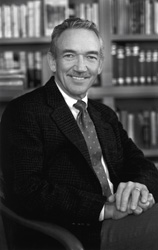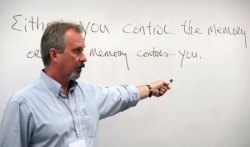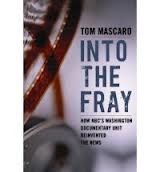Q&A with Professor Randall B. Woods
 Friday, October 3, 2014 at 6:56AM
Friday, October 3, 2014 at 6:56AM  Randall B. Woods is the author most recently of Shadow Warrior: William Egan Colby and the CIA, a biography of the late former CIA director. His other books include LBJ: Architect of American Ambition and Fulbright: A Biography. He is John A. Cooper Distinguished Professor of History at the University of Arkansas, and he lives in Fayetteville, Arkansas.
Randall B. Woods is the author most recently of Shadow Warrior: William Egan Colby and the CIA, a biography of the late former CIA director. His other books include LBJ: Architect of American Ambition and Fulbright: A Biography. He is John A. Cooper Distinguished Professor of History at the University of Arkansas, and he lives in Fayetteville, Arkansas.
Q: Why did you decide to write a biography of William Colby?
A: I teach courses on American history, and I’ve taught a course on the Vietnam War. If you look at the literature of the war, for most scholars, the war ended after Tet in 1968. The number of pieces in the media on Vietnam dropped off. After Mr. Nixon was in office, he and [Henry] Kissinger decided eventually to get out.
Initially, the Johnson administration [followed General William] Westmoreland’s policy of search and destroy. People like Bill Colby in the foreign policy establishment were arguing that this was the wrong way to fight the war—we are trying to build [a country], let the Vietnamese fight their own fight—and they began to turn Johnson around. He authorized CORDS [Civil Operations and Revolutionary Development Support], which was really a Colby brainchild.
This got me interested in the political, psychological type of warfare, and I began to go back and saw that two cultures developed [in the CIA]—espionage and nation-building.
Colby is an interesting figure….[In the CIA] there are good, principled people doing very bad things, and that makes for nice literary tension….
There were two trajectories—on the ground in South Vietnam, we were building communities and making the countryside more secure; we could never do anything about the government in Saigon. This was a fairly successful operation. It’s as if counterinsurgency and pacification was going in one direction and the White House was going in another. There’s a tragic element to that.
In the military, the CIA, USAID, there were very bright people, a lot had advanced degrees. They were very thoughtful about the war, and very interesting to interview.
Q: What surprised you most as you were researching the book?
A: These people on the ground who worked for Colby…a lot of people came to believe by the end of the war that the National Liberation Front, if not the North Vietnamese Communist Party, were Vietnam’s best chance for [success].
[Given] the lack of political cohesion in the South, the enemy they were fighting was going to be the country’s salvation. That was very tragic. Colby was a true believer; he never bought into that. His disciples admired him, but they saw him as flawed in that respect.
Colby was trying to organize civilian defense groups. The idea was that the communities fought to defend themselves; that may or may not have been true. From the point of view of the government in Saigon, what Colby was doing was subversive; any independent armed group in the countryside, they viewed as a threat. Colby was trying to create secure communities, while they were trying to undermine it.
There’s been some stuff on CORDS, but the books written have been very bureaucratic and dry. It’s full of stories…there’s a lot of romance.
Q: You write, “In truth, despite his goodwill and good intentions, Bill Colby…would do more to divide and demoralize the CIA than any of his predecessors.” Why was that?
A: It was force of circumstances; he didn’t do it on purpose. He was confronted with the [CIA’s] “family jewels,” [various illegal or controversial tactics or plans that were coming to light in the wake of Watergate and Vietnam], and the White House wanted him to stonewall. He thought that was wrong.
The community is still divided; there are people who think he’s a traitor. On one level, he’s a constitutional lawyer, that’s how he was trained. He perceived that if Congress determined to find out things about CIA, it not only could do that but had a right to. His loyalty was to the Constitution.
Politically, he believed that if he wasn’t forthcoming to Congress and the press, in the wake of the antiwar movement, Congress might do away with the CIA, which he loved. In his eyes, he was making compromises to save the CIA. Others didn’t see that. There were people I interviewed, old professionals, who believe he erred. It’s very much [former CIA director Richard] Helms [versus] Colby.
Q: Colby’s death was mysterious. What do you think really happened?
A: I think he was murdered….You never really leave the CIA. He was involved in things I just caught a whiff of. People were operating out of Australia; he had probably some involvement with the contras. I think he knew the truth about Oswald’s connections with the Cubans. There are just so many things. I think he was killed, but I have no proof about who did it.
Q: What did his family think of your book?
A: They’re deeply divided. The oldest son and youngest son [gave] complete cooperation and encouragement. The middle son was initially cooperative. He’s an independent filmmaker, and made a film on his father that features his mother. [The idea in the film is that] he left and betrayed his family…and drowned himself in a fit of depression….The surviving daughter didn’t like the way I treated her mother, so she’s mad at me.
Q: What are you working on now?
A: Eight or nine years ago I did a big biography of Lyndon Johnson, but there was a lot I had to leave out. I’m doing a book on the Great Society as a great reform movement, and trying to compare it with other great reform movements of the 20th century. There are lot of 50th anniversaries coming up…
Q: Anything else we should know?
A: The Phoenix program [in Vietnam] was very controversial at the time. It became a whipping boy for the antiwar movement. We were doing to the Vietcong what they were doing to the South Vietnamese. The Vietcong had terrorist units that were probably responsible for [thousands] of deaths. The Phoenix program was designed to eradicate them.
The idea was that American special forces and Seals would work with the South Vietnamese intelligence and counterterrorism teams, and gather information at the local level, and arrest or kill them.
The Phoenix program is a predecessor to the current drone program; the techniques are the same, the methods are different. It’s an iteration of that. There are shadows of CORDS in Afghanistan. [General] David Petraeus worked for Colby. The issues Colby had to deal with are very much alive today.
--Interview with Deborah Kalb. This Q&A is also posted on deborahkalbbooks.blogspot.com.





